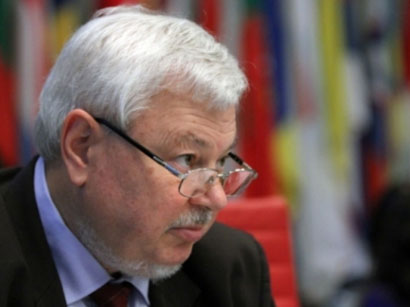Baku, Azerbaijan, Oct. 19
Trend:
High ranking political leaders from different countries have offered their support to the activity of the OSCE Minsk Group, established to mediate between the parties to the Nagorno-Karabakh conflict.
Ambassador Andrzej Kasprzyk, Personal Representative of the OSCE Chairperson-in-Office said in an interview with Azernews newspaper.
With regards to criticism in the address of the OSCE MG, Kasprzyk said co-chairs are informed in detail about the developments around the Nagorno-Karabakh conflict.
“The Chairmanship of the OSCE is paying constant attention and is informed in detail about developments. The Chairperson-in-Office, Dr Steinmeier, visited the region and the resolution of the conflict was high on the agenda of his trip. The CiO and other high ranking political leaders from different countries have offered their support to the activity of the MG,” he said in an e-mail, further mentioning that the conflict is a frequent subject of public debate in other international organizations besides the OSCE.
Kasprzyk emphasized that the co-chairs are involved in this mediation activity on a daily basis.
Kasprzyk, commenting on the armistice between the sides on the frontline, said that his office follows the situation on a daily basis.
Citing the information obtained from OSCE observations, Kasprzyk said that from the end of May 2016 the situation along the line of contact between Azerbaijani and Armenian troops has been relatively stable, though there were still reports about ceasefire violations and recently about casualties. "Every casualty is a tragedy and causes grief and sorrow for the family and friends of the deceased. I share these sorrows,” he said , adding that “the ceasefire will only hold based on the political will of the parties.”
“Finally, I would like to stress that the monitoring exercises are not investigations, nor are they a peacekeeping measure. They provide a ‘snapshot’, an effective and consistent way of accessing information regarding the situation on the ground. With the support of the sides, we will continue our activity,” he continued.
As for the expansion of the Office of the Personal Representative of the OSCE Chairman-in-Office, Kasprzyk said that his mandate and the modalities of work of his Office would be unaffected.
The conflict between the two South Caucasus countries began in 1988 when Armenia made territorial claims against Azerbaijan. As a result of the ensuing war, in 1992 Armenian armed forces occupied 20 percent of Azerbaijan, including the Nagorno-Karabakh region and seven surrounding districts.
The 1994 ceasefire agreement was followed by peace negotiations. Armenia has not yet implemented four UN Security Council resolutions on withdrawal of its armed forces from the Nagorno-Karabakh and the surrounding districts.






